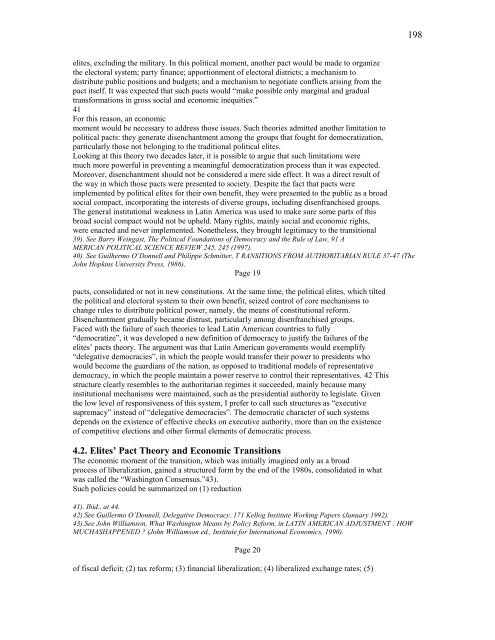FILSAFAT KORUPSI - Direktori File UPI
FILSAFAT KORUPSI - Direktori File UPI
FILSAFAT KORUPSI - Direktori File UPI
You also want an ePaper? Increase the reach of your titles
YUMPU automatically turns print PDFs into web optimized ePapers that Google loves.
elites, excluding the military. In this political moment, another pact would be made to organize<br />
the electoral system; party finance; apportionment of electoral districts; a mechanism to<br />
distribute public positions and budgets; and a mechanism to negotiate conflicts arising from the<br />
pact itself. It was expected that such pacts would ―make possible only marginal and gradual<br />
transformations in gross social and economic inequities.‖<br />
41<br />
For this reason, an economic<br />
moment would be necessary to address those issues. Such theories admitted another limitation to<br />
political pacts: they generate disenchantment among the groups that fought for democratization,<br />
particularly those not belonging to the traditional political elites.<br />
Looking at this theory two decades later, it is possible to argue that such limitations were<br />
much more powerful in preventing a meaningful democratization process than it was expected.<br />
Moreover, disenchantment should not be considered a mere side effect. It was a direct result of<br />
the way in which those pacts were presented to society. Despite the fact that pacts were<br />
implemented by political elites for their own benefit, they were presented to the public as a broad<br />
social compact, incorporating the interests of diverse groups, including disenfranchised groups.<br />
The general institutional weakness in Latin America was used to make sure some parts of this<br />
broad social compact would not be upheld. Many rights, mainly social and economic rights,<br />
were enacted and never implemented. Nonetheless, they brought legitimacy to the transitional<br />
39). See Barry Weingast, The Political Foundations of Democracy and the Rule of Law, 91 A<br />
MERICAN POLITICAL SCIENCE REVIEW 245, 245 (1997).<br />
40). See Guilhermo O‘Donnell and Philippe Schmitter, T RANSITIONS FROM AUTHORITARIAN RULE 37-47 (The<br />
John Hopkins University Press, 1986).<br />
Page 19<br />
pacts, consolidated or not in new constitutions. At the same time, the political elites, which tilted<br />
the political and electoral system to their own benefit, seized control of core mechanisms to<br />
change rules to distribute political power, namely, the means of constitutional reform.<br />
Disenchantment gradually became distrust, particularly among disenfranchised groups.<br />
Faced with the failure of such theories to lead Latin American countries to fully<br />
―democratize‖, it was developed a new definition of democracy to justify the failures of the<br />
elites‘ pacts theory. The argument was that Latin American governments would exemplify<br />
―delegative democracies‖, in which the people would transfer their power to presidents who<br />
would become the guardians of the nation, as opposed to traditional models of representative<br />
democracy, in which the people maintain a power reserve to control their representatives. 42 This<br />
structure clearly resembles to the authoritarian regimes it succeeded, mainly because many<br />
institutional mechanisms were maintained, such as the presidential authority to legislate. Given<br />
the low level of responsiveness of this system, I prefer to call such structures as ―executive<br />
supremacy‖ instead of ―delegative democracies‖. The democratic character of such systems<br />
depends on the existence of effective checks on executive authority, more than on the existence<br />
of competitive elections and other formal elements of democratic process.<br />
4.2. Elites’ Pact Theory and Economic Transitions<br />
The economic moment of the transition, which was initially imagined only as a broad<br />
process of liberalization, gained a structured form by the end of the 1980s, consolidated in what<br />
was called the ―Washington Consensus.‖43).<br />
Such policies could be summarized on (1) reduction<br />
41). Ibid., at 44.<br />
42).See Guillermo O‘Donnell, Delegative Democracy, 171 Kellog Institute Working Papers (January 1992).<br />
43).See John Williamson, What Washington Means by Policy Reform, in LATIN AMERICAN ADJUSTMENT : HOW<br />
MUCHASHAPPENED ? (John Williamson ed., Institute for International Economics, 1990).<br />
Page 20<br />
of fiscal deficit; (2) tax reform; (3) financial liberalization; (4) liberalized exchange rates; (5)<br />
198

















